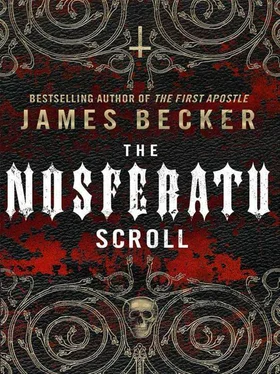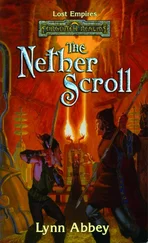James Becker - The Nosferatu Scroll
Здесь есть возможность читать онлайн «James Becker - The Nosferatu Scroll» весь текст электронной книги совершенно бесплатно (целиком полную версию без сокращений). В некоторых случаях можно слушать аудио, скачать через торрент в формате fb2 и присутствует краткое содержание. Жанр: Триллер, на английском языке. Описание произведения, (предисловие) а так же отзывы посетителей доступны на портале библиотеки ЛибКат.
- Название:The Nosferatu Scroll
- Автор:
- Жанр:
- Год:неизвестен
- ISBN:нет данных
- Рейтинг книги:4 / 5. Голосов: 1
-
Избранное:Добавить в избранное
- Отзывы:
-
Ваша оценка:
- 80
- 1
- 2
- 3
- 4
- 5
The Nosferatu Scroll: краткое содержание, описание и аннотация
Предлагаем к чтению аннотацию, описание, краткое содержание или предисловие (зависит от того, что написал сам автор книги «The Nosferatu Scroll»). Если вы не нашли необходимую информацию о книге — напишите в комментариях, мы постараемся отыскать её.
The Nosferatu Scroll — читать онлайн бесплатно полную книгу (весь текст) целиком
Ниже представлен текст книги, разбитый по страницам. Система сохранения места последней прочитанной страницы, позволяет с удобством читать онлайн бесплатно книгу «The Nosferatu Scroll», без необходимости каждый раз заново искать на чём Вы остановились. Поставьте закладку, и сможете в любой момент перейти на страницу, на которой закончили чтение.
Интервал:
Закладка:
He had exactly one chance, and it all depended on the unconscious man lying on the ground a few feet behind him. Keeping as low as he could, he scuttled over to the unmoving figure, and crouched down beside him. He pulled open the man’s jacket, searching desperately for a shoulder holster and a weapon he could use to save his life. But there was nothing, no sign of a pistol under either arm.
Bronson looked over to the tomb of the twin angels. The two men seemed to have separated: one had ducked back behind the tomb, and was keeping low, but Bronson couldn’t see the second man, the one who’d fired the pistol.
Then another shot cracked out, the bullet again missing Bronson, but only barely. The second man had moved around to the east, to get a better shot at him, and was standing only about fifteen yards away in the classic target-shooting stance: feet apart, the pistol held in his right hand, and his left hand supporting his right wrist.
The next shot, Bronson knew, would probably be the last thing he would know in this world, because from that range the man couldn’t possibly miss him.
39
Almost despite herself, Angela was finding the task she’d been given quite fascinating. The dictionary was very comprehensive, and she had no difficulty in rendering the Latin expressions and sentences into modern English, albeit sometimes lengthy and rather convoluted modern English.
She knew that the grave on the Isola di San Michele dated from the early nineteenth century, and she still believed that the diary had been written by the woman who was buried there, and that the book had been interred with her by her family as a mark of respect. Indeed, the sections of the diary that she’d already translated back in the hotel room showed the unmistakable cadences of the kind of Latin she would expect to have been written by a well-educated person — male or female — of that period.
But the section at the back of the book, the text she was now being forced to translate, was very different. Although Angela was fairly sure that it had been written by the same person who had authored the diary sections — the handwriting was quite distinctive — apart from the first few sentences, which seemed to act as a kind of introduction, the remainder of the text shared none of the characteristics of the earlier pages.
The more she read and worked on, the more sure she was that this Latin had been copied from a much older source, which would confirm what Marco had told her — most of it was a copy of a far more ancient document, interspersed with comments and additional material presumably supplied by Carmelita. Some of the language was mediaeval, she thought, maybe even older than that. She could find no explanation anywhere in the text to suggest what exactly the source book had been, but there was something faintly familiar to her about some of the phrases and expressions the unknown author had used, and Angela began to wonder if what she was looking at was a passage taken from a mediaeval grimoire. That might actually tie up with Marco’s apparent belief that the source document dated from the twelfth century.
Whatever the source, the Latin text made for grim but fascinating reading. The passage began with a long paragraph, almost messianic in its fervour, which baldly asserted that vampires were a reality, and that they had existed since the dawn of time. These creatures were older than the rocks and the stones that formed the continents. They had, the text claimed, been known to all the great writers of antiquity; and it even listed the names of a handful of ancient Greek philosophers who had explicitly mentioned them.
Angela had snorted under her breath when she translated that particular section. She was reasonably familiar with the works of two of the philosophers named in the book, and couldn’t recall either of them ever mentioning anything quite as bizarre as vampires. And, she noticed, the author of the text had conspicuously failed to mention where these explicit references might be found, which was a sure sign that the references were simply a product of the writer’s imagination.
Having established, to the author’s satisfaction at least, that vampires existed, the text continued with the unsurprising claim that these creatures were not human in the usual sense of the word. They looked human, the writer stated, and were extremely difficult to identify, but they were actually superhuman because of their immortality, great physical beauty, and the enormous depth of knowledge gleaned over the ages that they had walked the earth.
Angela could see that, if this belief had become accepted by the general population in the days when it had been written, almost any reasonably attractive and well-educated man or woman could have been suspected of being a vampire. And, at the height of the various anti-vampire crazes that had swept Europe at intervals during the late Middle Ages, it was likely that many people would have suffered the consequences.
In the final section of what Angela was mentally calling ‘the introduction’, the writer set out the ultimate purpose of the treatise. In the following paragraphs, it was stated, fully detailed instructions would be provided so that mere mortals, if seized with a true and honest wish and desire to achieve a state of sublime perfection , might be elevated to a higher plane and actually join the legions of the undead.
She’d been right: what she was translating was a do-it-yourself vampire kit. Angela finished the introduction, read the Latin text and her English translation once more, then placed the page on one side of the desk.
Marco, who’d been sitting in a chair a few feet away from Angela while she worked on the text, stood up and walked over to the desk. He picked up the English translation she’d prepared, and nodded to her to continue working.
The next section of the text provided a stark reminder of the life of Carmelita Paganini, and of what she had tried to achieve. One sentence in particular served as a hideous confirmation of her apparent attempts to join the ranks of the undead, and even offered other people the opportunity of trying to join her. It also served as a further confirmation of Marco’s contention that there was, indeed, an older source document that Carmelita must have seen.
This sentence read: I now know the truth of the deeper realities that have governed the actions and conduct of my ancestors, and of the gift of eternal life that only the most dedicated adepts can enjoy, and I have had sight of the rules governing the conduct of those sacred rituals and measures which will enable seekers after this most exquisite of gifts to benefit to the fullest possible extent, to achieve immortality through the mingling of new blood with sacred relics, to become a sister of the night, a member of the holy brotherhood and sisterhood of blood, as I have done .
Angela read the sentence again a couple of times, changed a few of the phrases to make it read better, and then put the page aside. The meaning seemed absolutely clear to her. Clear, but senseless. The woman who’d kept the journal and written those words had believed that she’d found the secret of eternal life, by becoming a vampire. Granted, the actual word ‘vampire’ didn’t appear in the sentence, but the last few phrases seemed to be clear enough. Carmelita Paganini had believed she was going to live for ever, by feasting on a diet of blood and sacred relics — whatever they were.
There were only two problems with her belief, as far as Angela could see. First, vampires don’t exist. They are a myth, a pre-mediaeval legend, with no basis in reality whatsoever. Second, Angela had found the woman’s diary in a grave on the Isola di San Michele, lying underneath what was left of a wooden coffin, which contained the bones of the woman herself, the presumed author of the book, and she’d looked pretty dead to her.
Читать дальшеИнтервал:
Закладка:
Похожие книги на «The Nosferatu Scroll»
Представляем Вашему вниманию похожие книги на «The Nosferatu Scroll» списком для выбора. Мы отобрали схожую по названию и смыслу литературу в надежде предоставить читателям больше вариантов отыскать новые, интересные, ещё непрочитанные произведения.
Обсуждение, отзывы о книге «The Nosferatu Scroll» и просто собственные мнения читателей. Оставьте ваши комментарии, напишите, что Вы думаете о произведении, его смысле или главных героях. Укажите что конкретно понравилось, а что нет, и почему Вы так считаете.












